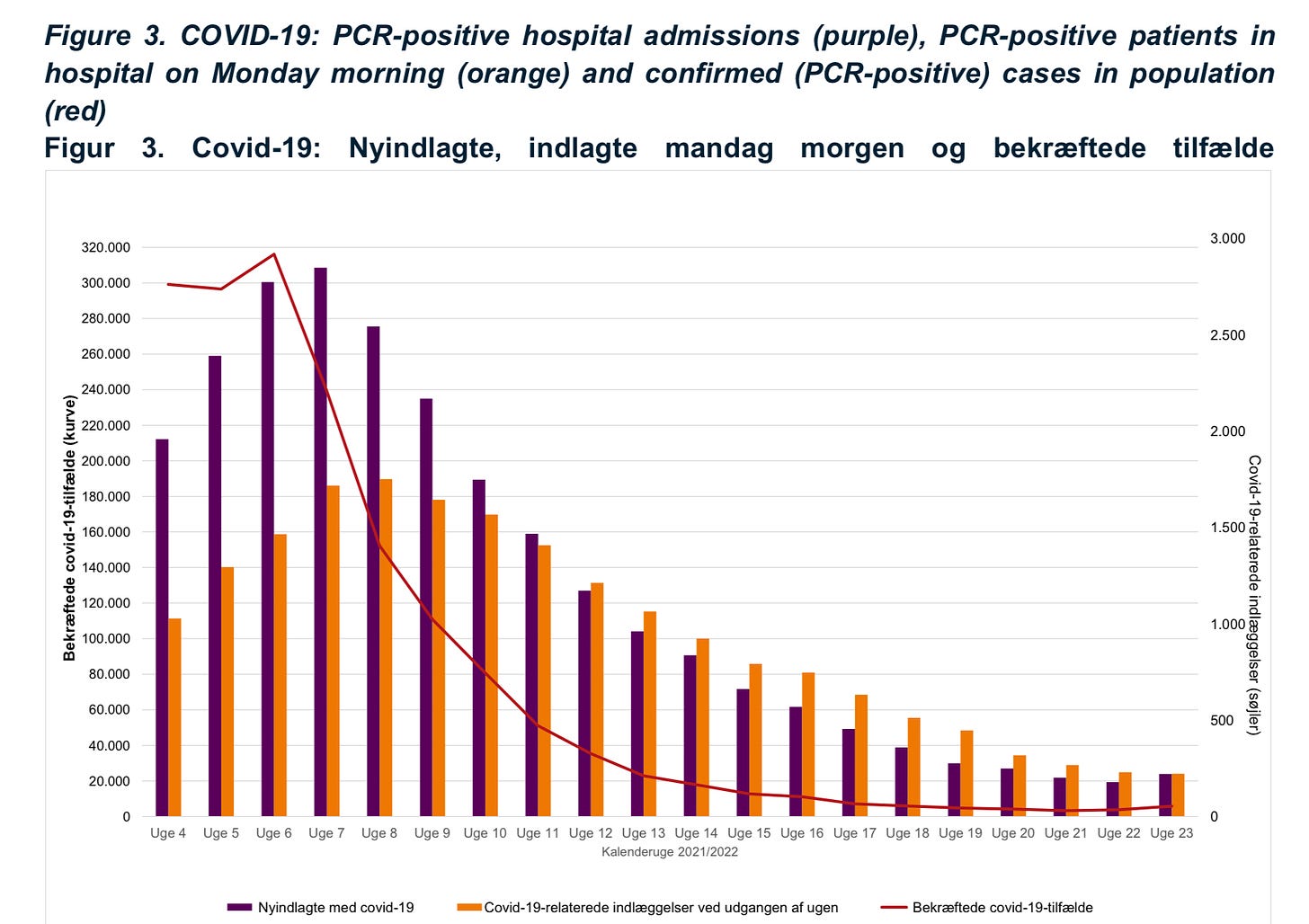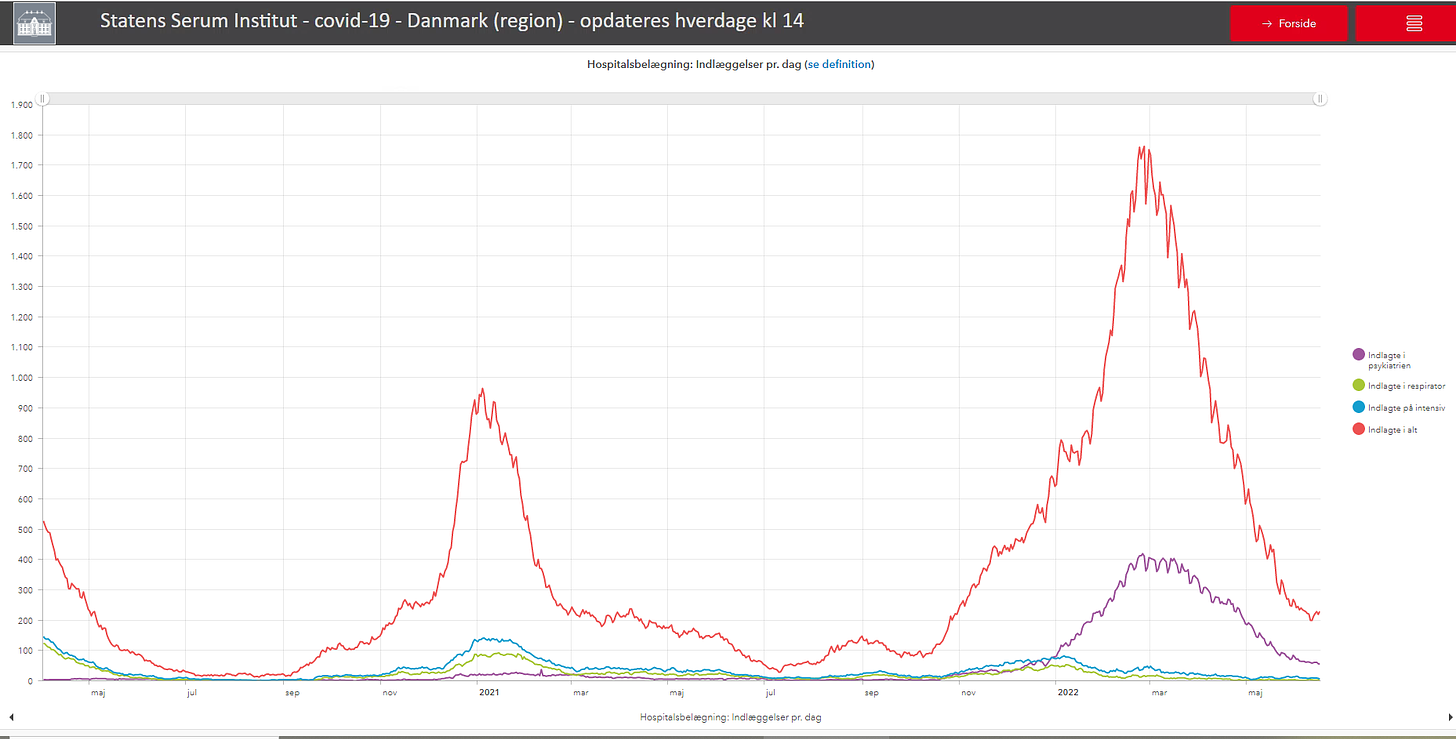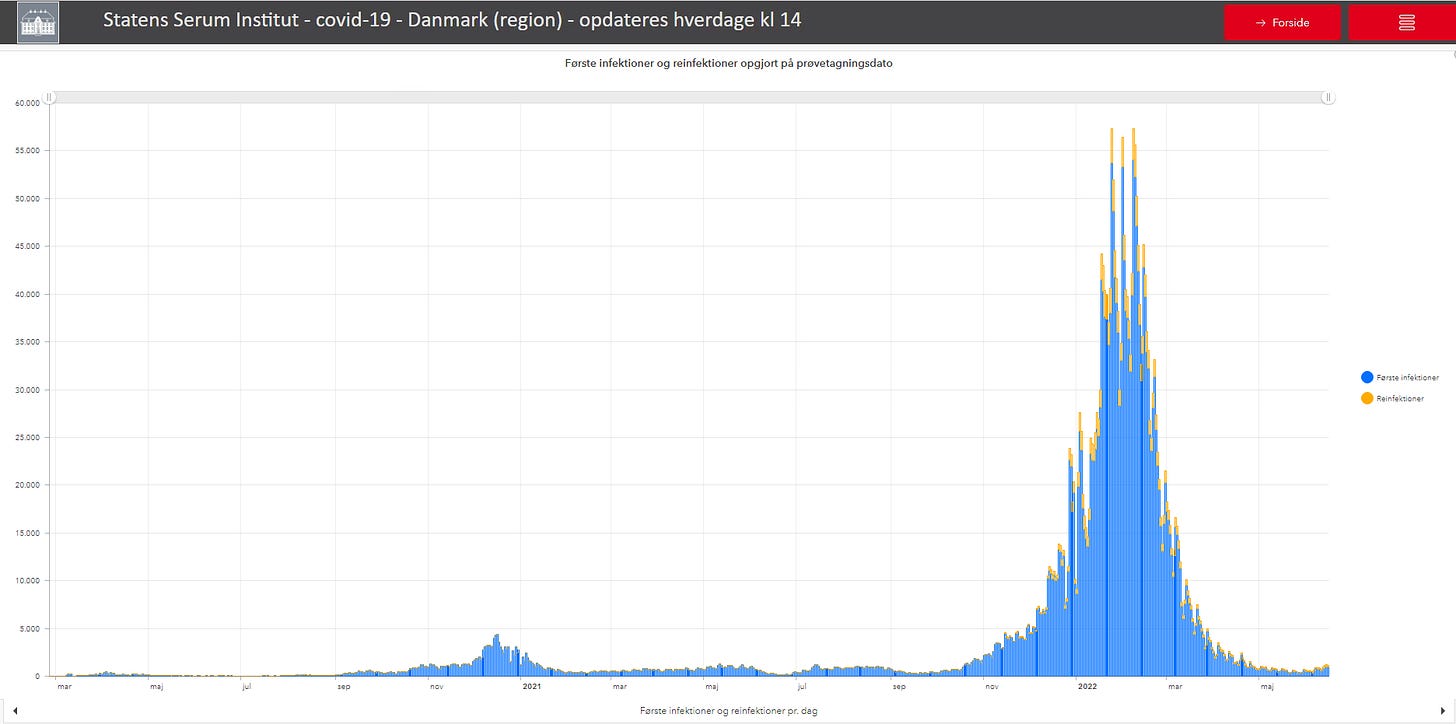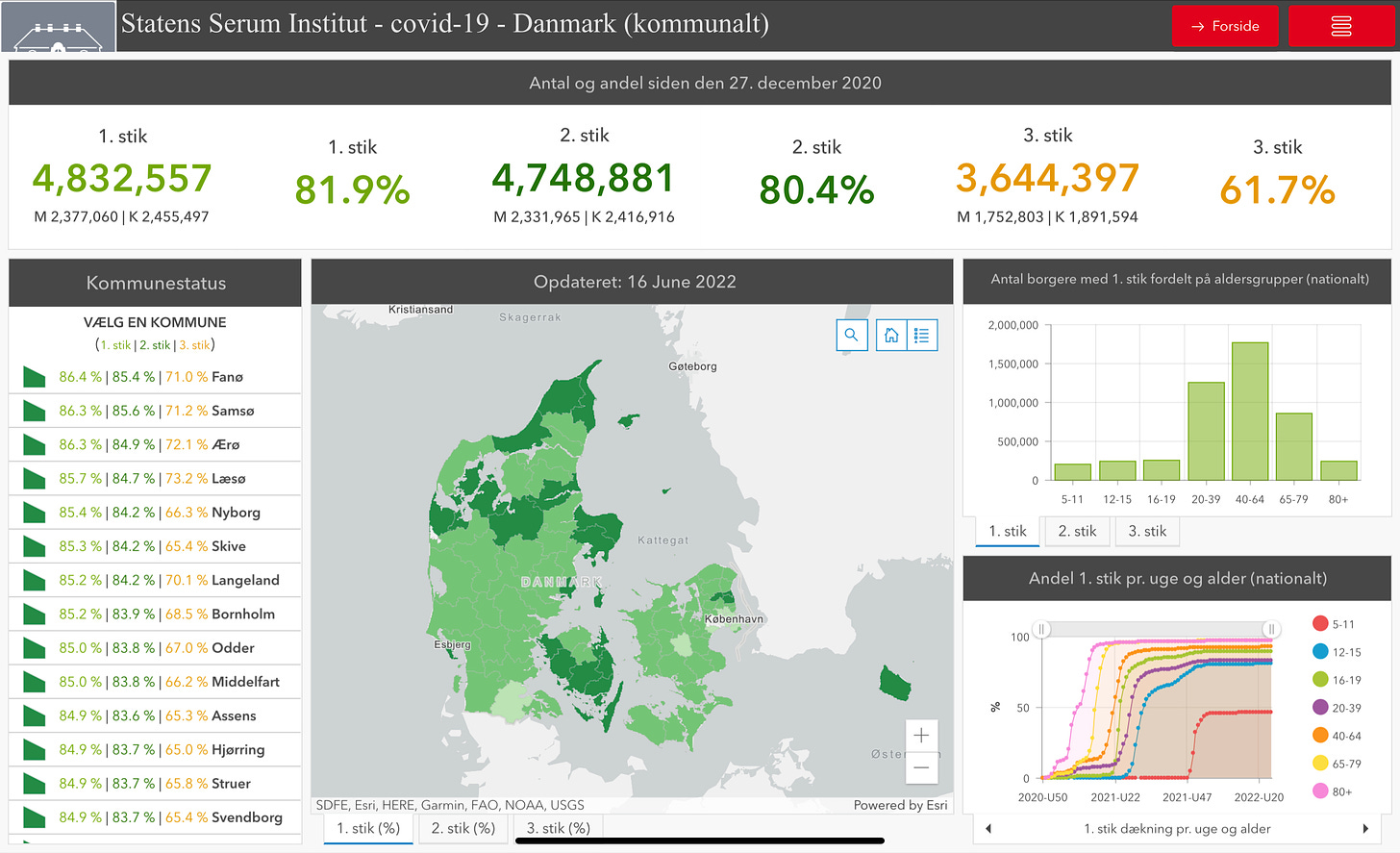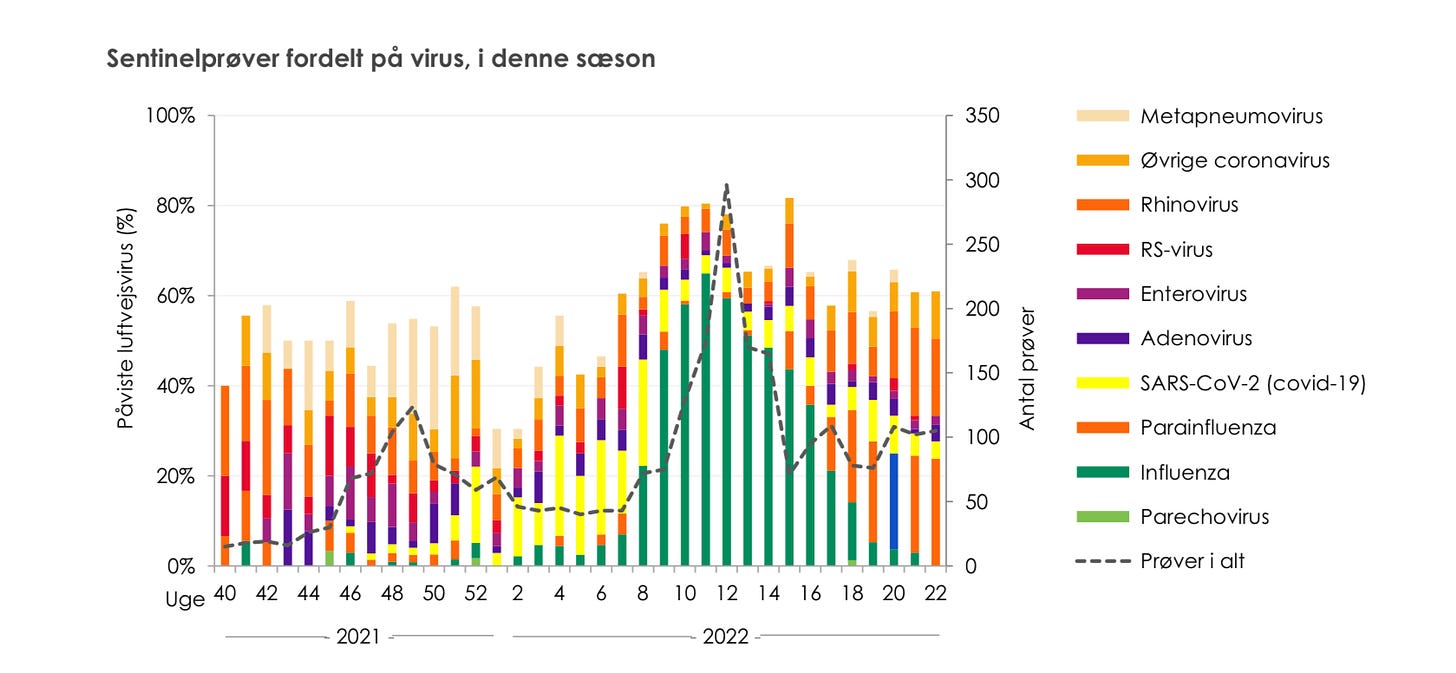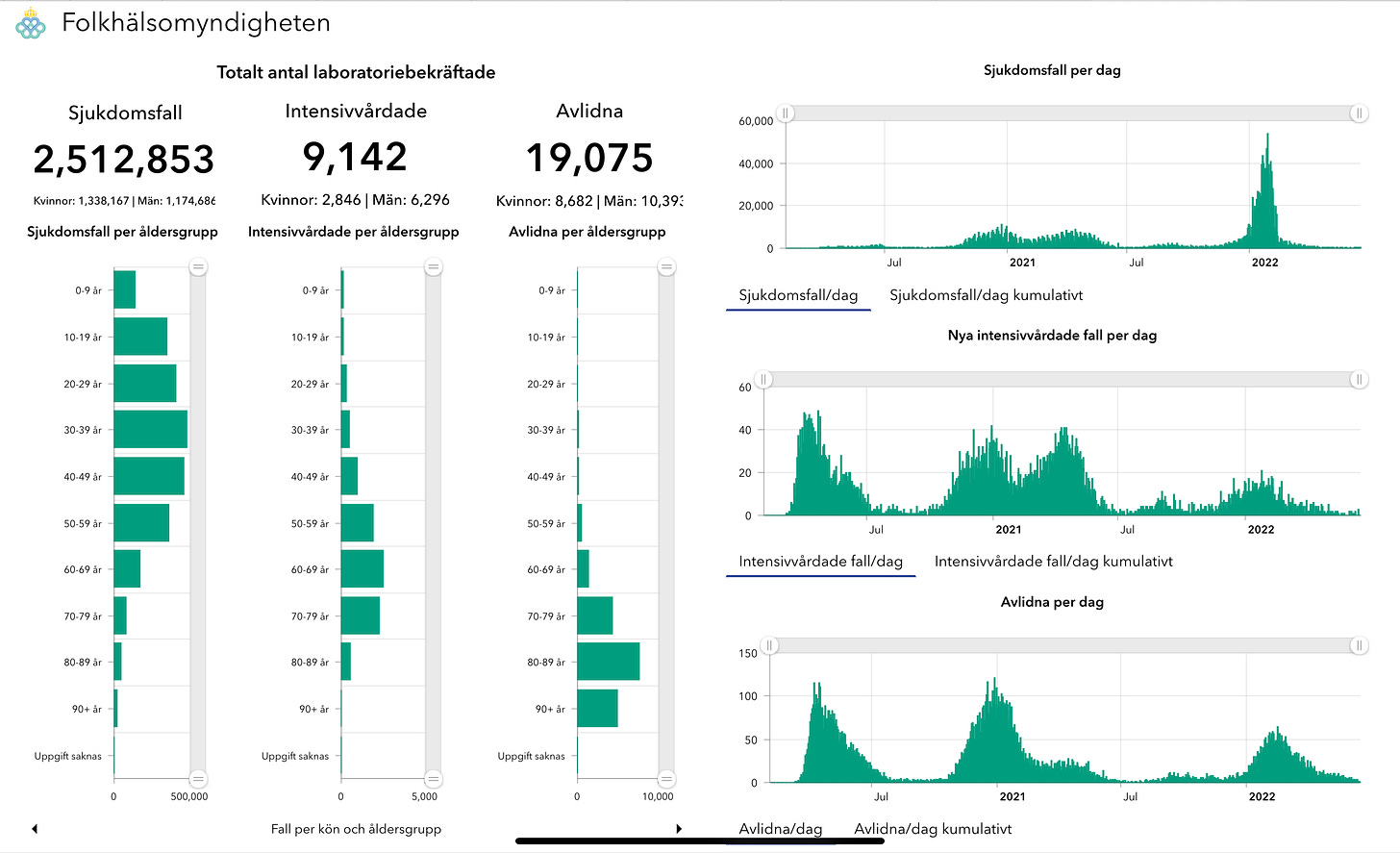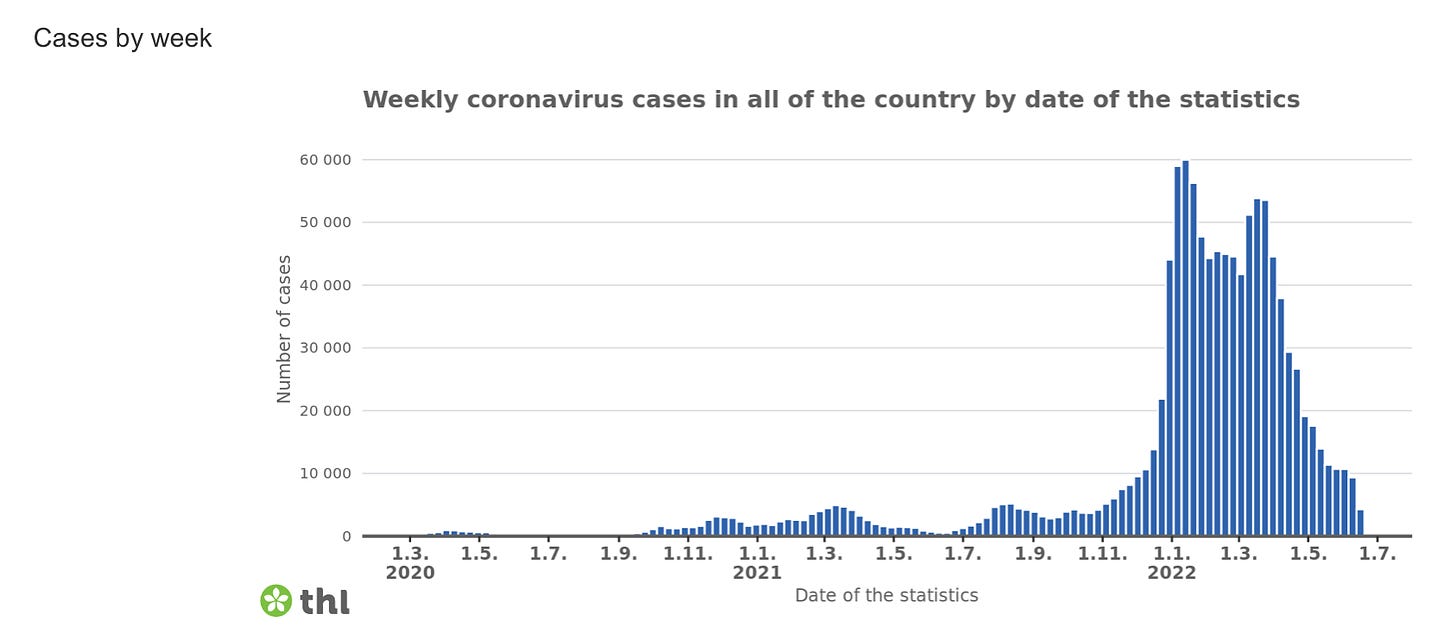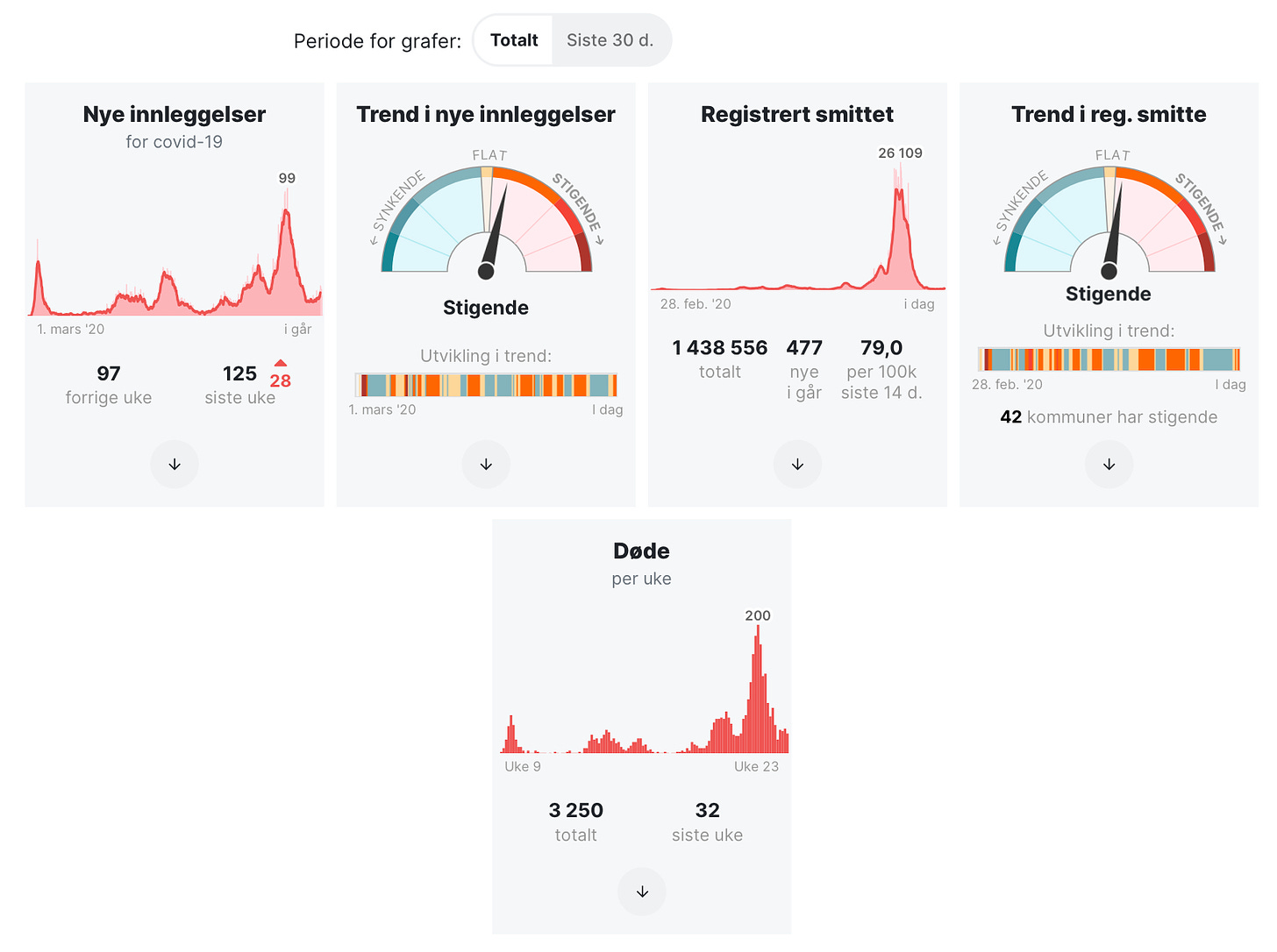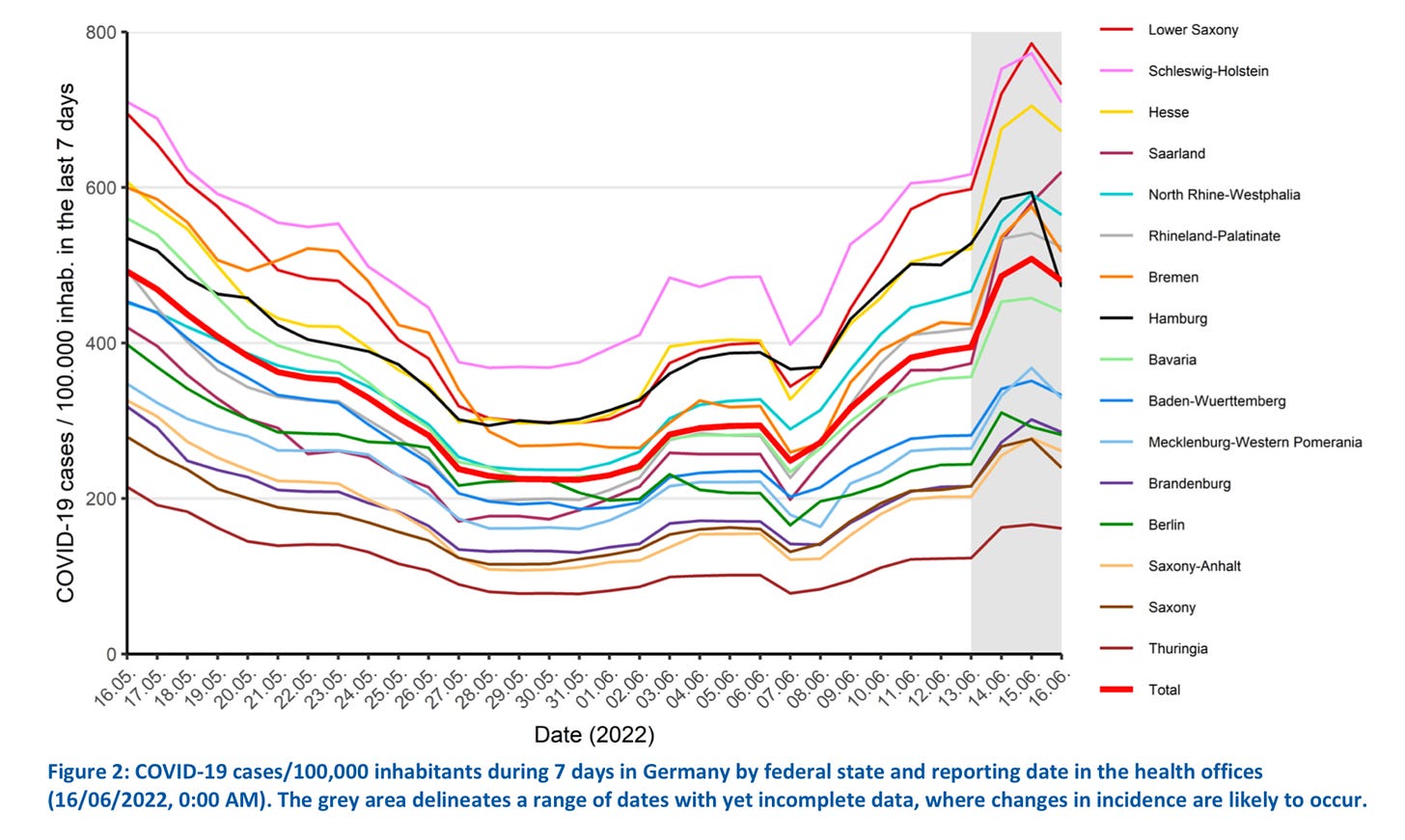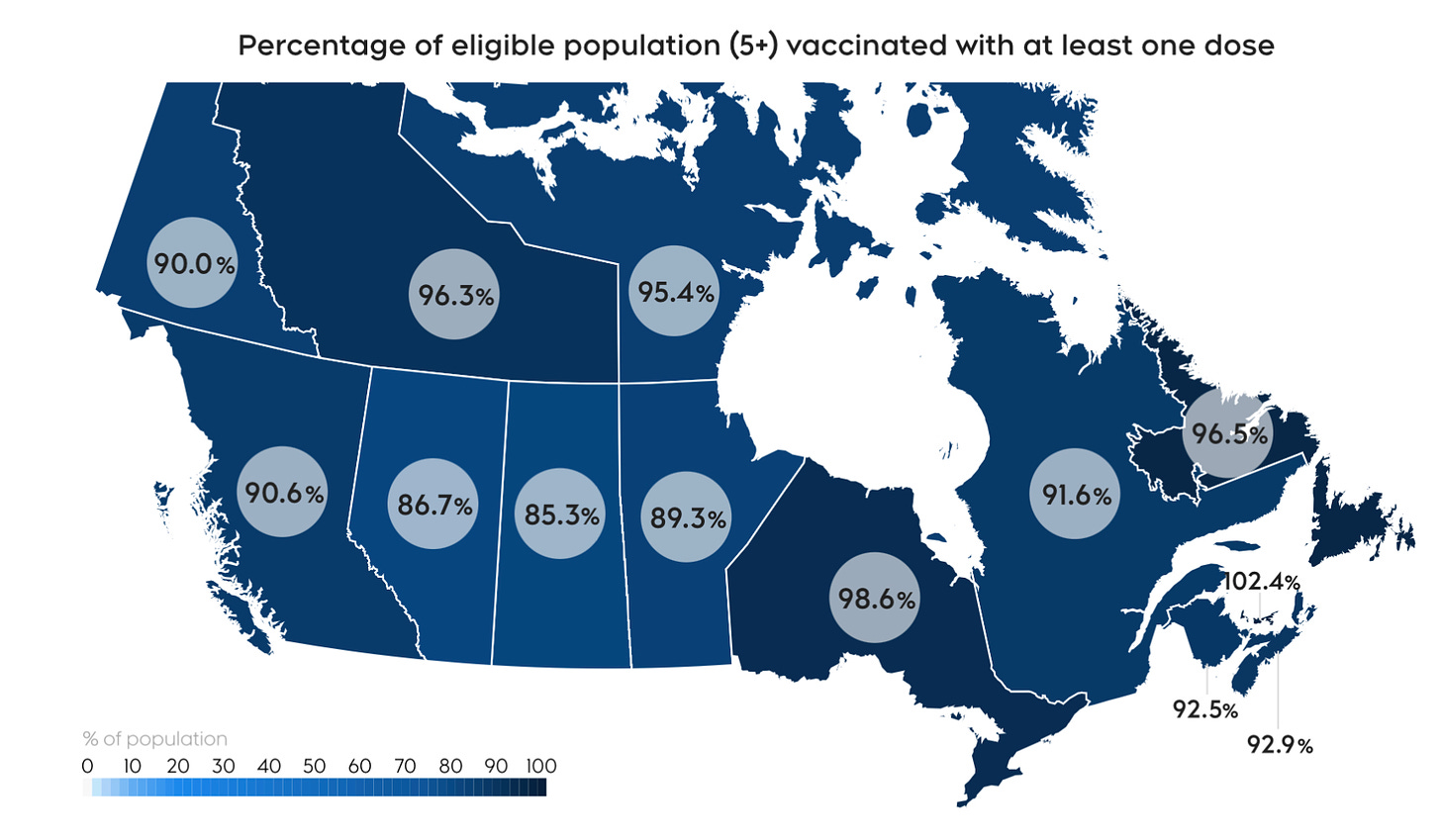The Evening Report - June 16
Denmark’s COVID barometers are rising fast as new variant spreads.
🦠Pandemic🦠
🇩🇰
The Omicron sub-variant is driving a new infection wave in Denmark. In its latest weekly pandemic assessment, the Statens Serum Institute says COVID cases increased by 53% last week compared to the week before. The positivity percentage is also surging upward, jumping from 12% to 17% from one week to the next. Even PCR testing numbers are increasing, up by 11% last week. Looking at the positivity percentage at the regional level, Region Midtjylland’s 17.4% is the highest while Region Nordjylland is the lowest with 14.5%.
Metro Copenhagen (Region Hovedstaden) continues to have the highest COVID incidence rate with 121 per 100,000 residents. Region Sjælland is trailing right behind with an incidence rate of 101. The incidence rate rose across all five Danish regions.
The COVID incidence rate has sharply increased across all age groups. Those 50 to 69 years old have the highest incidence rate with 162 per 100,000 people. The same age group also had the highest positivity percentage at 19%. The lowest was among children three to five years old with 6.5%.
Even COVID hospitalizations are now increasing, as they rose by 23% with 220 new admissions last week. Seniors 70 to 89 years old continue to make up the largest group of infected people being admitted to hospital. Intensive care numbers remained stable, with nine last week. 45% of those admissions were directly because of a severe infection, while 55% were admitted to hospital for another non-pandemic reason but who were also infected.
COVID fatalities also stayed stable with 25 deaths last week, although the SSI continues to caution that number is “preliminary.”
Infection numbers are also rising among one of the most tested, and most vulnerable, populations in Denmark, seniors in care and those who take care of them. Testing rates actually declined slightly among nursing home residents, while the positivity percentage surged from 3.9% to 6.4%. Confirmed infection cases also jumped week to week, going from 35 to 50. The virus claimed the lives of seven seniors in care last week, two more than the week before. Among healthcare staff working in senior care homes while testing numbers treaded water, the positivity percentage rose from 5.5% to 8.8%.
Among healthcare staff in hospitals and other health facilities, the positivity percentage has rocketed up from 10.9% to 18.5% in a week.
No surprise, but COVID wastewater surveillance is also seeing increasing rates of virus activity at the national level and across all five Danish regions.
The BA.5 variant is continuing its March towards dominance in Denmark, making up approximately 29% of all sequenced positive test results last week. Rates of the BA.4 and BA.2.12.1 strains are increasing, but at a much lower pace than BA.5. Again, the SSI is cautioning that there is still a “particularly large” number of positive test results last week that have not yet been sequenced.
SSI Professional Director Tyra Grove Krause:
“Until mid-May, BA.5 accounted for less than 1% of the weekly sequenced samples, but towards the end of May, we can see that this variant is growing. Now we can see that BA. 5 has a good grip, and we expect it to be dominant towards the summer holidays.”
The SSI concludes that all of these numbers are not good, especially with the positivity percentage outstripping the increased amount of PCR testing. It is warning that there is a “high probability” that infection numbers will continue to rise in parallel with the spread of the BA.5 variant. Most concerning, it notes, “signals” of increasing hospital admissions “especially among older age groups.” It cautions that the BA.5 variant could drive hospitalizations back up in the coming weeks.
-
COVID hospitalizations (229) have crept up (+10) while the number of severe infections in an ICU (6) have edged down (-2) and of those, the number on a ventilator (3) is unchanged day to day. Infection admissions to a psychiatric ward (55) inched down (-1).
-
Denmark has reported 1,222 COVID infections (underreported), including 172 reinfections, and two more coronavirus deaths in the last day.
There were 7,492 PCR tests taken yesterday equaling a positivity percentage of 16.31%, over the last 7 days it is 17.09%.
-
On the vaccination front, there hasn’t been much movement with 81.9% of the total population with one vaccine dose, 80.4% have two, and 61.7% have a booster dose.
Denmark’s vaccination campaign has been paused, but you can still get inoculated as vaccination sites remain open. Invitations and reminder letters are no longer going our.
-
The risk of developing any of a wide variety of blood diseases after having received a COVID vaccination is very low no matter which vaccine was used. But it also confirmed a link between a viral vector vaccine and cases of severe blood clots and platelet deficiencies. Those are the key findings of a newly released study by Danish, Norwegian, and Finnish health researchers.
The study involved 265,339 people from all three Nordic countries over a 17 month period. Researchers examined blood disease diagnosis and frequency before and after vaccination. The result was that blood clots and platelet deficiencies after vaccination were rare no matter what vaccine was administered.
The results have just been published in the acclaimed medical journal JAMA Network.
According to the study, for every 100,000 vaccinations there were 1.6 cases of severe blood clots in the brain and 4.9 cases of platelet deficiency when being vaccinated with AstraZeneca. For the mRNA vaccines, Pfizer/BioNTech had 0.1 cases of blood clots and 0.2 cases of platelet deficiency. For Moderna, there were even fewer cases of platelet deficiency and not a single case of blood clotting.
Statens Serum Institute Professor Anders Hviid led the Danish part of the study:
“It is a great strength of our study that we can compare across vaccines and across Nordic countries. We can confidently conclude that our results do not point in the direction that Pfizer/BioNTech and Moderna have similar connections with the rare and severe blood clots in the brain and platelet deficiency, which we have now observed in several studies for AstraZeneca.”
Denmark yanked AstraZeneca from its national vaccination campaign in the spring of 2021 after a Nordic study linked the vaccine to cases of severe blood clots and platelet deficiency. Norway and the rest of the Nordic nations would soon follow suit.
“Fortunately, we could not see any strong connection between the vaccines we have used most in the Nordic countries, the two mRNA vaccines, and the rare and severe blood clots and platelet deficiency.”
You can read the study in full HERE
-
This week’s sentinel monitoring report from the Statens Serum Institute shows parainfluenza, rhinovirus and “other coronaviruses” are the most common viruses coming back in tests of people with respiratory infections.
🇸🇪
Sweden has added 1,923 infections (wildly underreported) and another 26 corona deaths since its last update a week ago.
To date, 87.2% of the population 12 years old and older have one vaccine dose, 85.1% have two, and of those 18 years old and older 65.7% have a booster dose.
-
Another round of COVID vaccinations are coming for people in Sweden this fall. The Swedish Public Health Agency is recommending another booster dose for all seniors 65 years old and older, along with people considered to be high-risk. For everyone else 18 years old and older with three doses, there is no official recommendation to get a fourth, but they can still get another booster dose if they want it.
The system to book a vaccination appointment will open gradually in August, beginning with priority groups. The actual vaccinations will begin on September 1.
In Region Stockholm, people born in 1957 or earlier will be able to begin booking vaccination appointments in mid-august. A few weeks later, those under the age of 65 in high-risk and vulnerable communities will then get their opportunity to book another booster dose. The region says once the bulk of the priority groups are dealt with then the system will open for everyone else.
🇫🇮
Finland has registered 10,769 more infections and suffered another 57 virus deaths in the last week.
COVID hospitalizations (351) have dropped (-51).
So far, 80.3% of the total population have one vaccine dose, 77.2% have two, 53.3% have three, and 5.3% have a fourth.
-
The Finnish Institute for Health is now recommending a fifth COVID vaccine dose for anyone over the age of 12 who is severely immunocompromised. The health agency estimates there are about 10,000 to 30,000 people who might be eligible for a 3rd booster dose. The fifth shot is recommended a minimum of four months after having received a fourth dose.
Chief Physician Hanna Nohynek spoke to Finnish news agency Yle:
“For example, this includes people who are undergoing active treatment for cancer and organ transplant recipients who take medication that suppresses their immune response.”
The agency adds that surviving a coronavirus infection is equivalent to a single vaccine dose. So anyone with four doses who has then had an infection does not need a fifth shot.
🇳🇴
Norway has added 477 infections and reported no new pandemic deaths in the last day.
The Norwegian Institute of Public Health doesn’t report daily hospitalizations anymore but in the last week there were 125 infection admissions, which is 28 more than the previous seven day period.
So far, 80.5% of Norwegians 12 years old and older have one vaccine dose, 75% have two, and 54.9% have three.
🇩🇪
Germany has recorded 89,142 infections and lost 73 more lives to the coronavirus since Wednesday’s update.
It has added another 945 COVID hospitalizations while ICU numbers (668) dipped slightly (-7). As a percentage of all the intensive care beds in the country pandemic patients are using 3%.
To date, 77.6% of the total population have one vaccine dose, 75.9% have two, and 59.8% have a booster dose.
🇪🇺💉
Europe’s pharmaceutical watchdog has begun a rolling review into an updated Pfizer/BioNTech vaccine designed to protect against new variants of the virus. The European Medicines Agency says its review looked at everything from the upgraded vaccines chemistry to its manufacturing. It will also focus on the vaccine’s efficacy against the parent Omicron variants and its sub-strains.
“By starting a rolling review, EMA will be able to assess these data as they become available. The rolling review will continue until there is enough data for a formal application.”
The EMA is responsible for issuing or denying a recommendation for use for all pharmaceuticals in the European Union. If it issues a recommendation for use it then is up to the European Commission to make a final decision.
🇨🇦
The Public Health Agency of Canada has moved to a once-a-week COVID update releasing new numbers every Friday.
-
The Canadian vaccination effort has so far administered 33,533,956 1st vaccine doses (87.70% of the total population) while 31,394,116 people have a 2nd dose (82.11%) and of those, 20,305,442 people are fully vaccinated with three doses.
-
Ontario has ended daily COVID reporting and now will release raw data every Thursday on case numbers.
Quebec is reporting 812 new infections and nine more corona deaths. Hospitalizations (1,004) are down (-4) while ICU numbers (27) are up (+5). The province has a positivity percentage of 7.36%.
COVID hospitalizations have jumped in Newfoundland and Labrador, going from five to 14 from one week to the next. Of those, four are in an ICU. The province also reported three more coronavirus deaths and 500 new infections in the last week.
Nova Scotia registered ten more corona deaths in its latest weekly report. The number of infection cases confirmed by a positive PCR test result rose by 32% last week. The province has 21 people hospitalized due to an infection with three in intensive care.
In New Brunswick, COVID hospitalizations (27) inched down (-1) while the number of severe infections in an ICU (2) also crept down (-1). The province recorded one more infection death.
Saskatchewan is seeing COVID hospitalizations (165) head downward (-22) and ICU numbers (6) are also following suit (-10). But the province also added 17 more pandemic deaths in its latest weekly update.
In Manitoba, more people are dying from a coronavirus infection in the first six months of this year than they did in the same period in 2020. The province has suffered 2,015 COVID fatalities so far this year, adding 11 more in the last week. There were 80 new infection admissions last week, 20 fewer than the week prior. ICU numbers rose though, with 14 admissions last week, double the seven from the week before.
Alberta lifted all remaining COVID restrictions this week. Hospitalizations (719) have tumbled (-103) while ICU numbers (19) have also dipped (-5). The province reported 1,442 infections and 19 more pandemic deaths in its latest weekly update. The province has a seven day average positivity percentage of 13.21%
In BC, it has changed the way it reports and is adjusting the numbers retroactively. So on top of low testing numbers resulting in underreported cases, the weekly reports numbers also change in the weeks that follow. So for what it is worth, hospitalizations (276) are down (-49) ICU numbers (19) also slipped (-22). It is reporting 726 infections over the last week (underreported) and 50 more deaths.
🦠Monkeypox🦠
🇳🇴
Norway is reporting its first two monkeypox infection cases. The Norwegian Institute of Public Health says one of the people was infected in Norway while the other was exposed to monkeypox while traveling abroad. Neither are seriously ill.
The institute is invoking privacy protection and not providing a lot of detail on the two infected people and it doesn’t say if the two infected people knew each other or had any connection. It does say that contact tracing is underway to track down anyone in close contact with either person.
Department Director Siri Feruglio:
“It is not unexpected with a domestic infection with monkey pox, and the health service is prepared for this. We still consider the risk of widespread infection in the population to be very low.”
The NIPH is asking that anyone who becomes symptomatic to contact the healthcare service. The most common symptoms are fever, general malaise, swelling of the lymph nodes and a rash.
The health institute says after this it will not be pushing out any more press releases on any new monkeypox cases. Although cases will still have to be registered in the Communicable Diseases Notification System.
🇺🇦/ 🇷🇺 War
🇪🇺/ 🇮🇱/ 🇷🇺
The European Union is fighting to free itself of Russian oil and gas. It is planning to drastically ramp up production of renewable energy including a ten-fold increase in wind power in Europe’s North Sea. Now it has reached a deal with Israel to export a “considerable” amount of gas from Israel into the EU. This comes as Russia continues to lash out anyway it can as it puts the squeeze on energy supplies to Europe. Last month it turned off gas pipes to Denmark and Germany, as both countries refused to pay their bills in rubles as Russia had demanded.
🇪🇺/ 🇩🇪/ 🇷🇺
The Russian state run energy agency, Gazprom, is reducing the amount of gas flowing into Europe through the Nord Stream 1 pipeline. The company is using the excuse of repair work as gas supplies through the pipeline are slashed. German Minister of the Economy, Robert Habeck, isn’t buying what Russia is selling, telling Der Spiegel this is clearly a “political decision.” The German government is pledging that there will be no gas shortages in the country despite Russia choking off supply.
🇩🇰/ 🇺🇦
Support for Ukrainian refugees is still very strong in Denmark. Just 1% of those polled believe that the country should cut down on the number of refugees fleeing the war-torn country. The polling was done as part of a study from Aalborg University.
Politics and Society Professor Christian Albrekt Larsen says that Danes do not perceive the flow of refugees from Ukraine coming into Denmark as a refugee crisis. This is despite the fact that more Ukrainians have arrived in Denmark than refugees from Syria in what was perceived as a refugee crisis in 2015 and 2016.
“The Danes are preoccupied with something else. Rising prices and energy supply take up a lot of space. 38% say the main problem right now is rising prices.”
-
Denmark will host a ‘donors conference’ for Ukraine in the summer. The conference will be held in Copenhagen in August and will be jointly hosted by Denmark and the United Kingdom. It aims to strengthen cooperation between Ukraine and Northern European countries to ensure support continues to flow to Ukraine in its fight against Russia.
Danish Minister of Defense Morten Bødskov:
“I look forward to welcoming allied colleagues in Copenhagen in August. And of course especially my Ukrainian colleague Oleksii Reznikov. Denmark has taken great responsibility for the help and support for Ukraine, and we will continue to do so. Therefore, it is natural that Denmark hosts this important conference.”
The conference will focus on raising “concrete donations” for Ukraine and training its armed forces.
🇳🇴/ 🇫🇮 🇸🇪
As expected the Norwegian parliament has voted overwhelmingly to support NATO applications from both Sweden and Finland.
🇹🇷/ 🇫🇮 🇸🇪
At a press conference on Thursday, NATO Secretary General Jens Stoltenberg said a solution with Turkey as it holds up Sweden and Finland’s NATO bids will come “soon.” However, Stoltenberg did not provide a clear timetable when asked what soon meant.
Turkey at first supported the NATO bid by the two countries but then pulled a u-turn after they submitted their applications in an effort to use the situation for leverage. It continues to state concerns over what it says are the two countries relationship with groups it considers to be terrorist organizations.
🇬🇧/ 🇹🇷 🇸🇪 🇫🇮
UK Defense Secretary Ben Wallace said in Olso this week that he is hopeful that the issue with Turkey will be resolved and that the road cleared for Finland and Sweden can be approved for NATO membership by the end of June.
“Our ambition for Madrid is that Sweden and Finland are successfully on the next step towards accession into NATO.”
Wallace plans to pay a state visit to Turkey next week and that the Sweden and Finland issue will be on the agenda. He was speaking in Oslo following a meeting of the Joint Expeditionary Force, an alliance of northern and Eastern European allies.
🇨🇦 🇺🇸/ 🇺🇦
Canada and the United States both announced more help for Ukraine this week. Canada will spend $9 million on replacement barrels for howitzers it has already sent to Ukraine in its last weapons shipment. For its part, the United States is tabling another $1 billion for more military aid to Ukraine, including weapons shipments.




